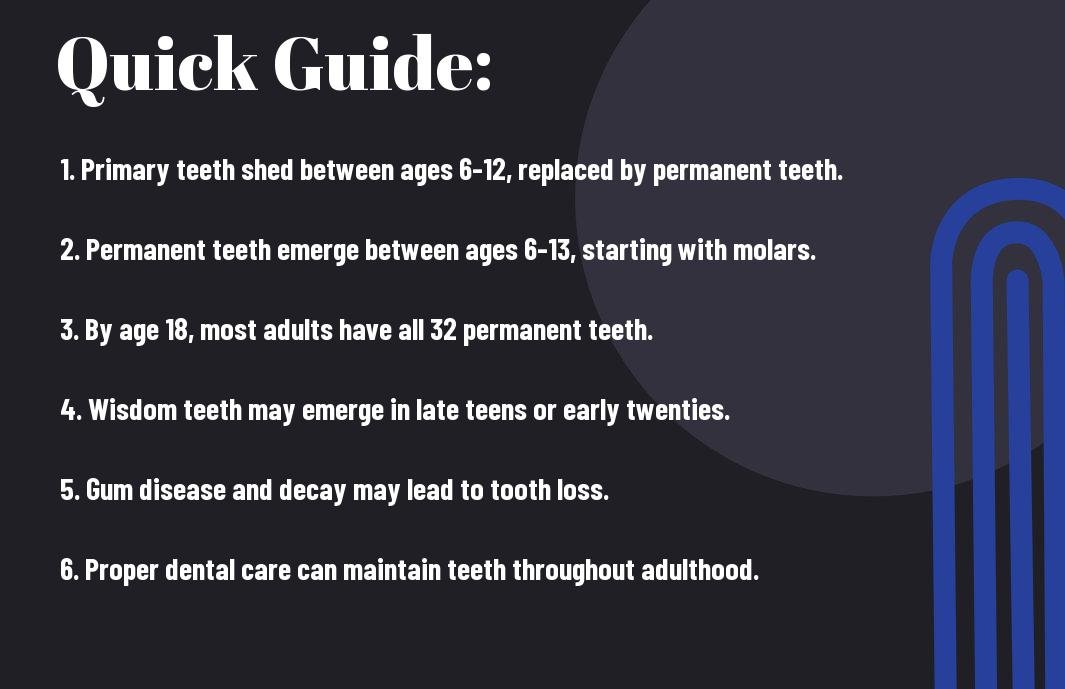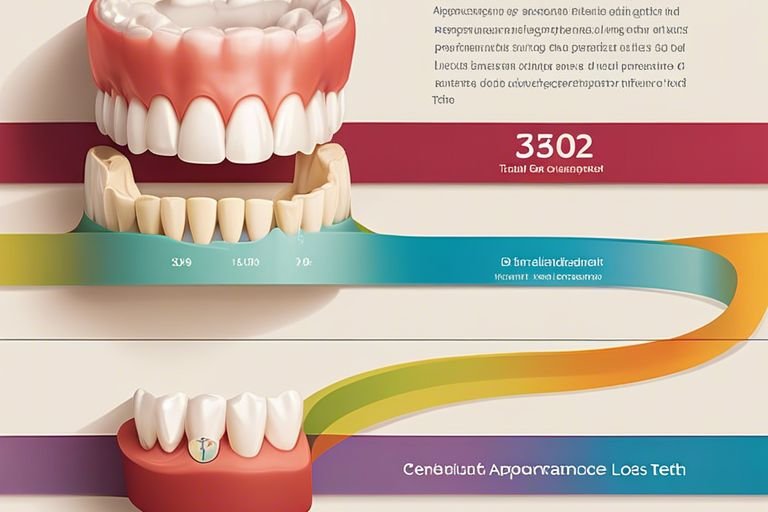Have you ever wondered at what age you stop losing teeth? As a dental professional, I have encountered numerous questions regarding the stages and timeline of tooth development. Understanding the process of tooth development and the age at which you stop losing teeth is essential for maintaining good oral health throughout your life. In this guide, I will take you through the stages of tooth development from infancy to adulthood, and help you understand the crucial milestones and potential issues to look out for along the way. By the end, you will have a comprehensive understanding of what to expect at each stage of tooth development and when you can expect to stop losing teeth.
Key Takeaways:
- Tooth development varies per individual: The age at which a person stops losing teeth can vary, with most people losing their primary teeth between ages 6 and 12, and then losing their last baby tooth around age 12 or 13.
- Permanent teeth development continues until early adulthood: The development of permanent teeth typically begins around age 6 and continues until early adulthood, with the eruption of the third molars, or wisdom teeth, often occurring in the late teens or early twenties.
- Specific stages of tooth development: The process of tooth development can be broken down into several stages, including the formation of primary teeth, the eruption of permanent teeth, and the shedding of baby teeth.
- Importance of proper dental care: Proper dental care, including regular dental check-ups, good oral hygiene habits, and a healthy diet, is essential for maintaining healthy teeth throughout all stages of tooth development.
- Implications for orthodontic treatment: Understanding the stages and timeline of tooth development can help determine the best timing for orthodontic treatment, such as braces, to address alignment issues and ensure optimal dental health.
The Stages and Timeline of Tooth Development
To truly understand the development and loss of teeth, it’s important to have a clear idea of the stages and timeline of tooth development. From the first signs of tooth buds in the womb to losing baby teeth and the emergence of adult teeth, the process is fascinating and crucial to overall oral health.
Types of Teeth
When it comes to the types of teeth, it’s important to be aware of the different functions and characteristics of each. The main types of teeth include incisors, canines, premolars, and molars. Each type serves a specific purpose in biting, tearing, and grinding food. Knowing the differences and functions of each type is essential for understanding oral health and development.
- Incisors: Used for biting into food and cutting it
- Canines: Used for tearing food
- Premolars: Used for grinding and crushing food
- Molars: Also used for grinding and crushing food
Knowing the roles of each type of tooth can help in understanding their development and loss.
Tips for Maintaining Healthy Teeth
Maintaining healthy teeth is essential for preventing tooth loss and ensuring proper development. Brushing regularly, flossing daily, and visiting the dentist for regular check-ups are crucial habits for maintaining optimal oral health. Perceiving the importance of these habits can lead to a lifetime of healthy teeth.
Step-by-Step Tooth Development Process
The step-by-step tooth development process involves several key stages, from the formation of tooth buds in the womb to the eruption of adult teeth. Understanding this process can provide valuable insights into oral health and development. Using a table with two columns, I can discuss the primary teeth development and permanent teeth development process in detail.
Factors Affecting Tooth Loss and Development
Several factors can impact tooth loss and development, including genetics, dental hygiene, diet, and injury. Though some of these factors may be beyond our control, it’s important to pay attention to the ones we can influence. Through proper dental care, a healthy diet, and the avoidance of risky behaviors, I can minimize the risk of tooth loss and maximize healthy tooth development.
Pros and Cons of Different Tooth Replacement Options
When it comes to tooth replacement options, it’s important to weigh the pros and cons of each. From dental implants to bridges and dentures, each option has its advantages and drawbacks. By using a table with two columns, I can outline the pros and cons of each option to provide valuable insights for individuals facing tooth loss.

What Age Do You Stop Losing Teeth – The Stages and Timeline of Tooth Development
So, in conclusion, the process of losing teeth is a natural and necessary part of tooth development that typically occurs between the ages of 6 and 12. This process is known as exfoliation, and it allows for the permanent teeth to emerge. The timeline of tooth development and exfoliation can vary from person to person, but it is generally completed by the age of 21. It’s important to remember to take good care of your teeth and visit your dentist regularly to ensure healthy development and maintenance of your teeth throughout this process.
FAQ
Q: At what age do children stop losing teeth?
A: Most children stop losing their baby teeth and start getting their permanent teeth around the age of 12. This process can continue until the age of 14. However, individual variations in timing are common.
Q: What are the stages of tooth development in children?
A: The stages of tooth development in children include the appearance of primary teeth (baby teeth) around 6 months of age, the eruption of permanent teeth between the ages of 6 and 12, and the shedding of baby teeth and the eruption of adult teeth between the ages of 6 and 14. The final stage involves the complete development and positioning of permanent teeth.
Q: What is the timeline for the development of permanent teeth in children?
A: The timeline for the development of permanent teeth in children typically starts at around age 6, when the first permanent molars come in, and continues until around age 12, when the second molars emerge. This process can vary, but it generally follows this pattern.
Q: What factors can influence the timing of tooth development in children?
A: The timing of tooth development in children can be influenced by genetics, nutrition, overall health, and dental hygiene practices. Children who have a family history of early or late tooth development may follow a similar pattern. Additionally, poor nutrition and health conditions can delay or accelerate tooth development.
Q: How can parents help their children during the stages of tooth development?
A: Parents can help their children during the stages of tooth development by encouraging good dental hygiene practices, providing a balanced and nutritious diet, and scheduling regular dental check-ups. Parents should also be observant of any delays or abnormalities in tooth development and seek professional advice if necessary.

